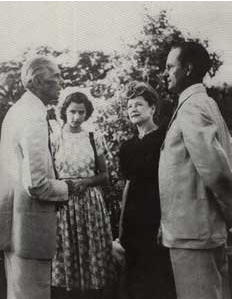The reputation of the Quaid-i-Azam Muhammad Ali Jinnah as the champion of Muslim rights, as the protagonist of the Two Nation Theory and as the Founding Father of Pakistan is so secure that I feel we may be in some danger of forgetting the long road which he had to travel before he could emerge as the Leader of the greatest Muslim mass-movement of our time. In saying this I do not refer only to the slow process of uniting sections or the Muslim community, deeply divided as they were in aims and outlook, in pursuit of a common objective, but also the struggle which went on in his own mind as hard facts compelled him to discard certain of the ideas which had inspired him to attain the first rank among Leaders of the All India Nationalist movement. This mental revolution, if I may use the term, was painful enough to drive him into temporary political exile, from which he only emerged when he had adjusted his thinking to meet the needs of a new situation. Experience had taught him, as it had taught the famous Florentine statesman, the deadly danger of mistaking things as they are for things as we would like them to be.
As a young contemporary of Muhammad Ali Jinnah – he was only thirteen years of age when I was born – I was privileged to follow his career in some details, and, indeed, to come into close contact with him at some of the turning points by which that career was marked. While it was still at school I began to see Mr. Jinnah’s name in print. I gathered that when he was only sixteen years old, his Father, a shrewd Khoja businessman of Karachi, had sent him to England to read for the Bar examinations; that when in England, he had come under the influence of that Grand Old Man of the Indian Nationalist Movement, Dadabhai Naoroji, then President of the Indian Society in London, and one of the founding members of the Indian National Congress. The young Jinnah became an enthusiastic convert to Congress ideas; and when, as a newly qualified Barrister, a decline in the family fortunes obliged him to seek wider opportunities than his native city of Karachi could offer, he migrated to Bombay, he found himself in a society which was already among the most flourishing seedbeds of these ideas in the India of the day. Jinnah was, it seemed, particularly attracted by the personality and outlook of Gopal Krishna Gokhale, who, on his part was delighted to find in Jinnah a man after his own heart. He wrote to him: “He has the true stuff in him; and that freedom from all sectarian prejudice which will make him the best ambassador of Hindu Muslim unity”. By 1996 Jinnah was not only building up a lucrative practice at the Bombay Bar; he was marked as a rising political figure. In that same year he acted as Secretary to Dadabhai Naoroji at the Calcutta meeting of the Indian National Congress when the ideal of self-government for India was formally adopted as a Congress objective.
Showing posts with label Williams. Show all posts
Showing posts with label Williams. Show all posts
Subscribe to:
Posts (Atom)
Nations are born in the hearts of poets!!!
The poetry of Allama Iqbal was a breath of fresh air throughout Pakistan Movement... ...This is the historical and extremely memorable pic o...

-
Quaid-e-Azam addressing a group of students 1. My young friends, I look forward to you as the real makers of Pakistan, do not be exploit...
-
In 1913 the Quaid-i-Azam joined the All India Muslim League without abandoning the membership of the Congress of which he had been an active...



